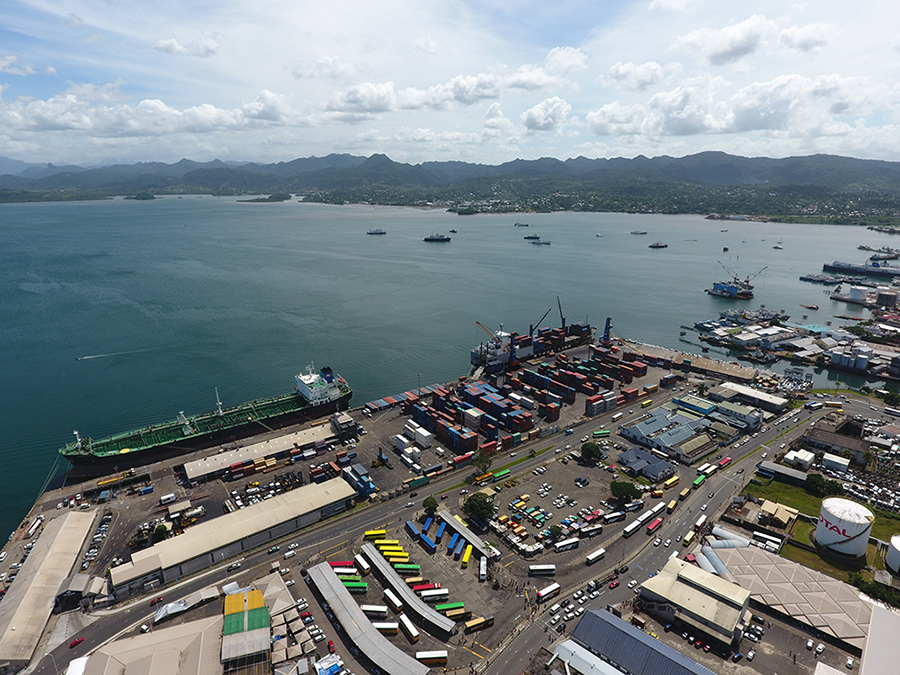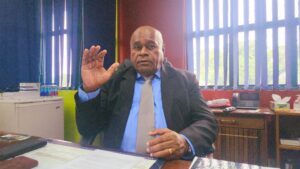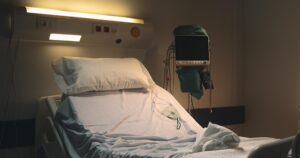The Fijian Government last night announced its revised budget that removes VAT on certain essential items, increased VAT on non-essential items including clothing and shoes, reviews the quota and eligibility under the TELS education scheme, revised allocation for infrastructure and health as well as removal of COVID-19 restrictions including mandatory masking, support for home-based SMEs, financial backing for the Fijian Drua, offerings for civil servants, and more all of which based on revised projected revenue of $2.25 billion and total expenditure of $3.72 billion resulting in a net deficit of $1.46 billion or 14.2% of GDP.
The net deficit represents a drop from a deficit of $1.6 billion or 16.2% of GDP that was projected when the initial 2021-22 budget was announced last July that projected revenue at $2.1 billion and expenditure at $3.7 billion. Debt is projected to reach 88.6 percent by the end of this fiscal year and based on the projected economic recovery and planned deficit reduction, the Debt to GDP ratio is expected to come down to below 80% in the next three years.
Announcing the revised budget, Fiji’s Minister for Economy Aiyaz Sayed-Khaiyum said the revised projections and allocations are based on preliminary data and partial indicators showing that the economy is on track to record the highest growth rate in Fiji’s history.
“We’re expecting the economy to grow by 11.3 percent in 2022 driven by the vaccination of our population and the reopening of our borders,” Sayed-Khaiyum said. “Other independent economic analysts put the figure even higher. It’s estimated to take three years until our economy is restored to pre-pandemic levels –– but we have started that journey back on sure footing because our overall macroeconomic fundamentals remain strong.
“VAT collections, imports of consumption goods, sales for both new and second-hand vehicles, retail sales, and borrowing for consumption are roaring back to life and have recorded strong growth for the last three months.
“Sectoral performance is positive as well, supported by agriculture, mahogany, forestry, and manufacturing. RBF’s job advertisement survey shows that employment has been on an upward trend for the past six months. Almost 25,000 jobs were added in the formal sector and a similar number in the informal sector. This is supported by total salaries & wages and FNPF contributions & PAYE.
“Visitor arrivals for the first three months since the border opened on 1 December 2021 are approximately 50,000 — over a thousand per cent more than one year ago.”
Shadow opposition minister for economy will provide his feedback on the budget today before Sayed-Khaiyum provides his response.
Some of the highlights of the revised budget are outlined below.
51% shareholding in Fijian Drua – Counter Ruck Pte Limited (CRL)
To support the Fiji Rugby Union and the Fijian Drua in meeting the New Zealand Rugby Union’s (NZRU) financing requirements for Super Rugby Pacific, the Fijian Government will invest $6 million for 51% shareholding in Counter Ruck Pte Limited, or CRL, which was established by the Fiji Rugby Union to own and operate the Fijian Drua.
The FRU had requested a grant, but Government is unable legally to give a grant to a private company. We can, however, take a share in the company and divest it at a later date.
Through this revised budget, the Fijian Government will allocate the first tranche investment of $3 million for 25.5 percent shareholding. The second tranche investment of an additional $3 million will be undertaken by December 2022 to secure the total 51%. By December 2022, the Fiji Rugby Union will own 49 percent shareholding while the Fijian Government will own 51 percent.
FRU will maintain management control of the Counter Ruck Pte Limited (CRL), and Government will consider divesting its shares once an opportunity arises.
Additionally, CRL will be granted a 13-year income tax holiday and will be provided a waiver for customs duty on goods imported specifically for Fijian Drua-related venues and High-Performance Base from 1 July 2022 to 30 June 2023.
Additionally, any sponsorship above $250,000 made to the Fijian Drua will receive a 200 percent income tax deduction.
Removal of interest on bank accounts with totals less than $1,000 in a year
Interest on bank accounts totalling less than $1,000 in a year will be exempt from the Resident Interest Withholding Tax.
This exemption covers more than 75% of holders of interest-earning bank accounts. People with low bank deposits, recipients of social welfare funds, senior citizens and students will benefit from this exemption, and they will not be required to apply for a Certificate of Exemption.
3-year 200% tax deduction for employers paying staff maternity leave
The Government will provide, for the next 3 years, a 200% tax deduction to those employers who will be paying maternity leave for their staff, for the sake of the mothers of Fiji.
100K marketing grant for Textile Clothing and Footwear (TCF) Council
To assist the Textile Clothing and Footwear (TCF) Council with rising import freight costs on top of the new increase to the sector minimum wage rates, the Government, for the next 3 years, will provide TCF Council a marketing grant of $100,000 to allow them to secure markets to expand.
In addition, the TCF sector will be waived for a customs entry for commercial consignments below $1,500 by FRCS.
Removal of VAT on essential items
From 1 April 2022, sugar, flour, rice, canned fish, cooking oil, potatoes, onion, garlic, baby milk, powdered milk, liquid milk, dhal, tea, salt, kerosene and cooking gas are all going to become VAT zero-rated –– as will household essentials including soap powder, toilet paper, sanitary pads, and toothpaste.
In total, this reduction will send $163 million in tax revenues back to the Fijian people and alleviate the cruellest burden that the pandemic and the Russian war have placed on our people’s backs.
We will continue to review the price of food and other essentials as time goes on, a flexible policy posture will be maintained to adapt to the current circumstances.
Reduction of fiscal duty on certain imported dairy products
As announced in the 2021-2022 budget, from 31 August 2022 the fiscal duty on imported liquid milk, full-cream powdered milk, yoghurt, cheese and butter will be reduced to 5% from the current 32%.
15% VAT on non-essential items
We will raise the VAT on 21 non-essential items to 15%. The increase in VAT to 15% will cover goods and services that previously attracted ECAL, such as prescribed services, white goods and motor vehicles, and will apply to all turnover in excess of $100,000.
ECAL will be removed and replaced by the adjusted VAT rate of 15% for these items. So tax on an item that carried 9% VAT and 5% ECAL would increase by only one percent.
The additional list of goods and services to be taxed at 15% VAT includes alcohol, tobacco, textiles, clothing & footwear, perfumes, jewellery, watches, stereos and sound systems and other electrical equipment, and professional services such as legal and accounting, management and consultancy, architectural and engineering, scientific research and development, advertising and market research, veterinary activities and other professional, scientific and technical activities.
Removal of current 20 cents fuel tax
To alleviate the sharp rise in fuel price due to the conflict in Ukraine, we will remove the current 20 cents fuel tax.
This will cost the Government approximately $56 million.
Prices remain volatile, and we will continue to monitor global crude oil prices and the events that are affecting them, such as the war in Ukraine.
In the same way, should crude oil prices stabilise, we may be able to reconsider this reduction.
Optional wearing of masks
From today (25/03/22), the wearing of masks will become optional and all venues may operate at full capacity. Social distancing requirements will no longer be enforced either.
It is up to people to apply the more than two years of experience we have with COVID to do what makes them feel comfortable and safe.
More services under the Free GPs scheme
Beginning in April, Fijians who qualify for the Free GP Programme will be able to access a range of blood tests, multi-urine dipstick tests, electrocardiograms, nebulizer treatment, oxygen supply, and ultrasound scans – all at no cost. GPs will prescribe medicine and even provide that medicine to patients after-hours if needed.
Support for physician in public sector wishing to set up private practice
Currently, a physician in the public sector who wishes to establish a private practice must find another private practitioner who is on the approved list of mentors. This is a very small list established by the Fiji College of General Practitioners. They then must work under that mentor for two years before being licensed to set up a private practice. This period can be extended for six months at the recommendation of the mentor.
Our reform will begin by allowing any physician who has been practicing in the public sector for more than seven years post-internship to enter private practice immediately as long as he or she receives a certificate of good standing from the Fiji Medical Council and is admitted to the Fiji College of General Practitioners and holds a post-graduate qualification in General Practice that is approved by the College. Physicians with three to five years’ experience would still have to work under a private mentor for two years, while physicians with five to 7 years’ experience will only have to work under a private mentor for 6 months. The specific details on this reform will be prescribed under an amendment to the Medical and Dental Practitioner (General Practice) Regulations 2010.
GPs under PPP can procure medicine from Govt pharmacy
From tomorrow (25/03/22), GPs under the Public Private Partnership scheme will not be restricted from procuring medicine from the Government pharmacy.
$200K to encourage private GPs to open surgeries/clinics in rural areas
$200,000 has been allocated to incentivise private GPs to open up new surgeries or clinics in rural areas; such as areas like Nawaicoba, Malolo, Naidovi, Drasa, Sabeto, Seaqaqa, Dreketi and Nasarawaqa. People have to travel hours to reach their nearest health care facility to get medical attention. Through this, we are trying to bring the doctors and the medical services closer to the people so that they have quick access.
Funded at half a million dollars, doctors under the Public Private Partnership scheme, and the people they serve, will be further supported by engaging private medical laboratories to analyse blood samples referred by GPs engaged under this programme.
Our rural inhabitants have the right to high-quality laboratory results, an essential component for the successful prevention, diagnosis and treatment of illnesses.
Certain dental services included under free GP scheme
The Free GP Scheme will also now include Free Dental Practitioners, as we will now also be engaging the private dental practitioners to improve the oral health of all Fijians, including school-aged children. People who once depended fully on the public health system for dental services and are not existing paying clients of private dental practitioners will have government-funded access to private dental care.
The cost of private dental services will be borne by the Fijian Government at an agreed price with individual dental practitioners and private medical dental centres and hospitals.
We will offer services like consultation, oral examination, extractions, and temporary and permanent fillings. Patients will be served faster, and dentists will expand their services to more patients through the same model as the Free GP programme.
A half-million dollars have been allocated for this initiative.
Outsourcing of medical equipment and public health system labs
Biomedical services like x-ray machines, magnetic resonance imaging (MRI) machines, ultrasound machines and CT scanners will also be outsourced. Public health system laboratories will also be maintained and operated 24/7 by the private sector in public hospitals.
This will reduce operating expenses at our public hospitals, allowing us to focus on our core responsibilities, and maximise equipment performance and longevity.
By outsourcing the maintenance of medical equipment also, we will have immediate access to the highest-level technician for even the most sophisticated devices. The provider will have to ensure that qualified technicians are always available. And there will be a requirement to have a certain percentage of up time. A half million dollars is allocated for this in the Revised 2021-2022 Budget.
Dialysis treatment subsidy to continue
We increased the subsidy from $75 to $150 per dialysis treatment for low-income patients; and second, we brought in Private Service Providers under the Kidney Dialysis Treatment Subsidy programme.
Since the announcement of these changes to the Programme through the 2021-2022 National Budget, the Ministry of Health and Medical Services has engaged five Private Service Providers to supplement the Government-operated facilities in Labasa, Suva, Lautoka and Nadera.
To date, a total of 135 registered patients are receiving their subsidised kidney treatment under the Dialysis Treatment Programme at six facilities across Fiji, with each patient receiving on average eight treatments per month. That support will continue in this revised budget with funding of $1.2 million.
Removal of 3-night stay requirement
After weeks of establishing private testing facilities nationwide, we are ready to remove the three-night stay requirement upon entry into Fiji. From 7 April, fully-vaccinated visitors, residents and citizens will only need to conduct a rapid antigen COVID-19 test within 24 hours of arrival in the country at an approved testing facility. A full list of the locations will be published online.
Bringing in more private sector test providers brings in competition that lowers prices and saves costs for visitors – especially tourists and those visiting friends and family or returning citizens –– making Fiji a more attractive destination. So instead of visitors being beholden to a hotel, they have the option of going to a nearby pharmacy that’s been approved to get their test done.
Removal of Travel Partner System
All visitors to Fiji will play by the same rules because from 7 April we will also do away with the Travel Partner system. The most important thing is that visitors be vaccinated. If they are, and if they are tested upon arrival, their country of origin is less important.
Marketing Gant to Tourism Fiji increased
Marketing grant to Tourism Fiji will increase by $893,000, to a total of $20.9 million. We are also allocating an increase of $700,000 for Tourism Fiji’s operational expenses. This will primarily be to bring back staff to five days a week and hire additional marketing staff.
Open-heart surgeries available at Lautoka Hospital from early May
From early May, open-heart surgeries will be available at the Lautoka Hospital –– marking the first time in history that this procedure will be available all days of the year in Fiji. Other benefits will be added in the coming months including cardiac catheterisation, chemotherapy and renal dialysis.
Concurrently, work is being undertaken to build a new Lautoka Hospital at the current site with no interruption to services.
Plans to migrate all of Viti Levu to digital television platform by May 2022
We had fully transitioned to the digital television platform by November 2021 for the areas from Pacific Harbour to Korovou and Nadi to Lautoka connecting over 130,000 households.
We are now focussing on the areas from Pacific Harbour to Nadi and Lautoka to Korovou, which will connect about 42,059 households by May 2022. Once completed, we can say that all of Viti Levu has been migrated onto the digital television platform.
We will commence with the digital switch-over activities. For the Fijians living in Vanua Levu and other parts of Fiji in July of this year.
Fijian Vaccine Pass (FVP)
Given the recent global surge in COVID cases and as part of future-proofing our COVID-19 response efforts, we intend to roll out the Fijian Vaccine Pass ( FVP) in the next few months.
The first phase will be focused on citizens and permit holders who have been vaccinated in Fiji and who need to travel overseas. We’ve allocated a budget for the operational and technical components, including the set-up of FVP personalisation and issuance centres in the Central, Western and Northern Divisions.
The Fijian Vaccine Pass will be in both digital and paper format and contain an individual’s profile picture for easier identification. It will be free of charge, safe and secure, and the vaccine certificates of all family members can be stored on one smartphone.
It will also display negative COVID test results and issue a verifiable, secure and interoperable QR code that can be scanned and ingested by the Fijian Vaccine Pass app.
Unemployment assistance for Vanua Levu
This budget has allocated $13 million towards unemployment assistance for Vanua Levu. These Fijians will have the opportunity to apply for one-off assistance of $100. The specifics of this plan will be announced soon.
This programme also includes one-off assistance of $50 to all social welfare recipients in Fiji.
Increase of bus fare subsidy for elderly and disabled
The bus fare subsidy for the elderly and disabled will be increased from the current $10 per month to $25 per month at a total cost of $6 million dollars benefitting close to 40,000 Fijians.
Additional $5.9 million for housing and community development
To meet mounting demand, in the Revised 2021-2022 Budget, the Ministry of Housing and Community Development is provided an additional $5.9 million in funding support.
Revised Social Housing Assistance Policy
The revised Social Housing Assistance Policy will support the construction of cyclone-certified houses. It will also move away from the old one-third and two-third contribution model. Instead, successful applicants will receive $10,000 grant assistance for the purchase and transportation of building materials.
The Social Housing Programme has been allocated $600,000 in the Revised 2021-2022 Budget to implement the revised policy.
Reimbursement of victims of the Peoples Community Network scams
$2.27 million for the reimbursement of the victims of the Peoples Community Network’s scams. In addition, the Ministry is in consultation with the Solicitor General’s Office to ensure the lease titles are transferred from Peoples Community Network to the Ministry of Lands and Mineral Resources.
$338.2 million provided to FRA
In the 2021-2022 Revised Budget, a sum of $338.2 million is provided to the Authority. $13.1 million will enable FRA to carry out its daily operations and $325.1 million will finance important capital programmes.
A sum of $72.9 million is allocated for the maintenance of Fiji’s transport network and road assets such as drainage, footpaths, railings, signage, lights and signals.
Water Authority of Fiji
The Revised 2021-2022 Budget for the Water Authority of Fiji is $195.2 million, of which $80.7 million is for operating expenditure and $114.5 million is for capital investment in our water and wastewater network. Some of the projects include emergency water tanks in communities where water supply is unreliable. Because while urgent work must be undertaken, communities can’t wait it out with an intermittent supply of water.
An allocation of $6.3 million is provided to address the water disruption issues in the Suva-Nausori corridor, Nadi, Lautoka and Labasa.
To date, 34,385 households have benefited from Government’s free water initiative at a cost of $475,000. This will continue to expand in this financial year.
The Government will be bringing back the Rainwater Harvesting Programme whereby we provide a subsidy of 70% for rainwater harvesting systems in rural areas. Applicants are required to construct the base for the water tank and gutter system.
An amount of $1.0 million is allocated in the Revised Budget to cover those applications pending at Water Authority of Fiji since 2019 and delayed due to the COVID pandemic.
The Viria Project will reduce the number and extent of water disruptions and other woes in the Greater Suva-Nausori corridor, and an amount of $40.9 million is allocated for it in the Revised 2021-2022 Budget. Despite delays as a result of COVID-19, construction is well underway and expected to be completed by the first quarter of 2023. The total cost of the project is around $270 million.
This is one of the largest water infrastructure projects ever undertaken in Fiji. Once completed, the project will increase the capacity of the Water Authority of Fiji in the Suva-Nausori area by 40 million litres per day, with the plant designed for an additional capacity of 40 million litres per day.
Support for home-based SMEs
Through amendments to the Town Planning Act General Provisions for Schemes and Areas, we will allow home-based businesses to operate from residential areas without going through the rezoning process, provided they meet set conditions of operations that are in keeping with the residential nature of the area.
These would include restrictions on noise and equipment, signage, traffic, hours of operation and storage of hazardous materials. We can allow these businesses to operate in a neighbourhood so long as they don’t make that neighbourhood less quiet, peaceful, and livable.
TELS eligibility and quota revised
The Government has considered a one-off temporary measure to reduce the TELS entry mark to 250, except for the Commerce category, where the cutoff mark will remain at 280 with a quota of 850, due to the oversupply of graduates. Programmes in the Commerce category will still require an entry mark of 300.
The quota for TELS for degree programmes will now be increased from 2,000 to 2,942, with increased attention to areas such as Medicine and Health, Engineering, Science and Technology.
The accelerated Repayment Incentives (ARI) for TELS students was introduced in the 2018/2019 Budget to offer TELS students heavy discounts for the early repayment of loans.
For this initiative, the determination of the repayment period for discount eligibility will exclude 2020, 2021 and 2022.
The quota for nursing was set for 100 students for the 2022 new intake, but this may not be sufficient given the fact that many nurses are resigning – either leaving the profession or relocating.
To fill the gaps created by resignations and migration of nurses, the TELS quota for Bachelor of Nursing will be increased to 350.
The Government will provide 20 MBBS and 5 Bachelor of Dental Surgery awards to new students who have completed Year 13 with a mark of 340 in 2021 through the National
Toppers Scheme.
Those students who are registered on the TSLS Online Portal for 2022 intake can apply or change their programme to qualify.
To accommodate private MBBS students of 2021, the National Toppers Scheme will change to include those who did Year 13 in 2020, had marks of 340 and above, a GPA of 3.0 and above in 2021, and combined parental income of less than $100,000.
In the 2021-2022 National Budget, Government allocated funds for MBBS Students who had privately enrolled and met the criteria for a one-off $10,000 Government Grant. In February this year, 42 students were selected and can use the grant to clear off the fees for 2021.
Government will now provide full-time scholarships under the National Toppers Scheme effective from Semester 1 2022. This will amend the existing scholarship regulation to include these students who did year 13 in 2020.
Citizenship
Currently, a person only needs to be lawfully present in Fiji for 10 out of the 15 years prior to lodging an application for naturalisation. We will be increasing the requisite aggregate period to 15 out of the 20 years to protect and enhance the value of the Fijian citizenship.
While citizenship is becoming more difficult to obtain, we are adopting a more liberal approach for those looking to obtain work permits and investors seeking to establish permanent residence.
Civil Service
We have allocated $250,000 towards a civil service recognition programme whereby those development partners, private sector partners and civil servants who served the nation during the COVID-19 pandemic will be recognised with a medal award for their Outstanding Courage, Compassion and Commitment.
The Government is conducting a thorough Civil Service salary review to determine appropriate competitive remuneration – that is, salary and benefits–for positions we know to require scarce skills and personnel that we need to retain. There will be a review of the civil service salaries for retention and scarce skills. An allocation of $50,000 has been provided for this exercise.
$2.7 million is being allocated to appropriately remunerate 312 teachers who have upskilled their qualifications.
Effective from 1 April 2022, overtime will be reinstated for all civil servants on band E and below. Overtime will also be reinstated for registered nurses on Band F. Other officers on Band F and above will be entitled to Time Off in Lieu of overtime pay. This excludes teachers.
The Ministry of Civil Service will be issuing a circular in the coming week. Meal allowances will also be increased from $10 to $15.
We are bringing back rural and maritime allowances for Civil Servants with an allocation of $1 million.
The Government has allocated funding of half a million dollars to adjust the wages of civil servants who are hourly paid.
Suspension of family care and paternity leave
We have decided to put Family Care Leave on hold given the announced rise in wage rates. As a further measure to ensure we make the most out of the next few months, at least, paternity leave is also going on hold.
Review of 10 sectoral job classification
The current classification for the 10 sectors is decades-old and does not reflect the modern economy. Take for example, the printing industry. The sector has changed dramatically in this century through automation and digitisation –– but the job classification hasn’t changed at all.
We have to recognise these shifts and align sectoral wages with market realities to ensure that people are paid just wages for the jobs they perform.
National Minimum Wage
We will increase the minimum wage to $4.00 an hour in stages over one year period from its current level of $2.68. The revised minimum wage rate will be implemented in four tranches, starting at $3.01 from 1 April 2022, $3.34 from 1 July 2022, $3.67 from 1 October 2022 and $4.00 from 1 January 2023.
For all the other 10 sectors, the minimum wage rate will also rise in tandem with new rate and topped up by the relative difference between the current national minimum wage rate and the sectoral wages.
50K for establishment of Productivity Commission
To ensure that we are accurately assessing productivity across the economy, we’ve allocated $50,000 for the establishment of a Productivity Commission to measure productivity across all the wage sectors and provide advice to the Government on improving productivity.
This commission will not work in isolation – it will be a partner to employers and employees to address issues and complaints as they arise and identify where further wage increase can make the most difference for the economy.









